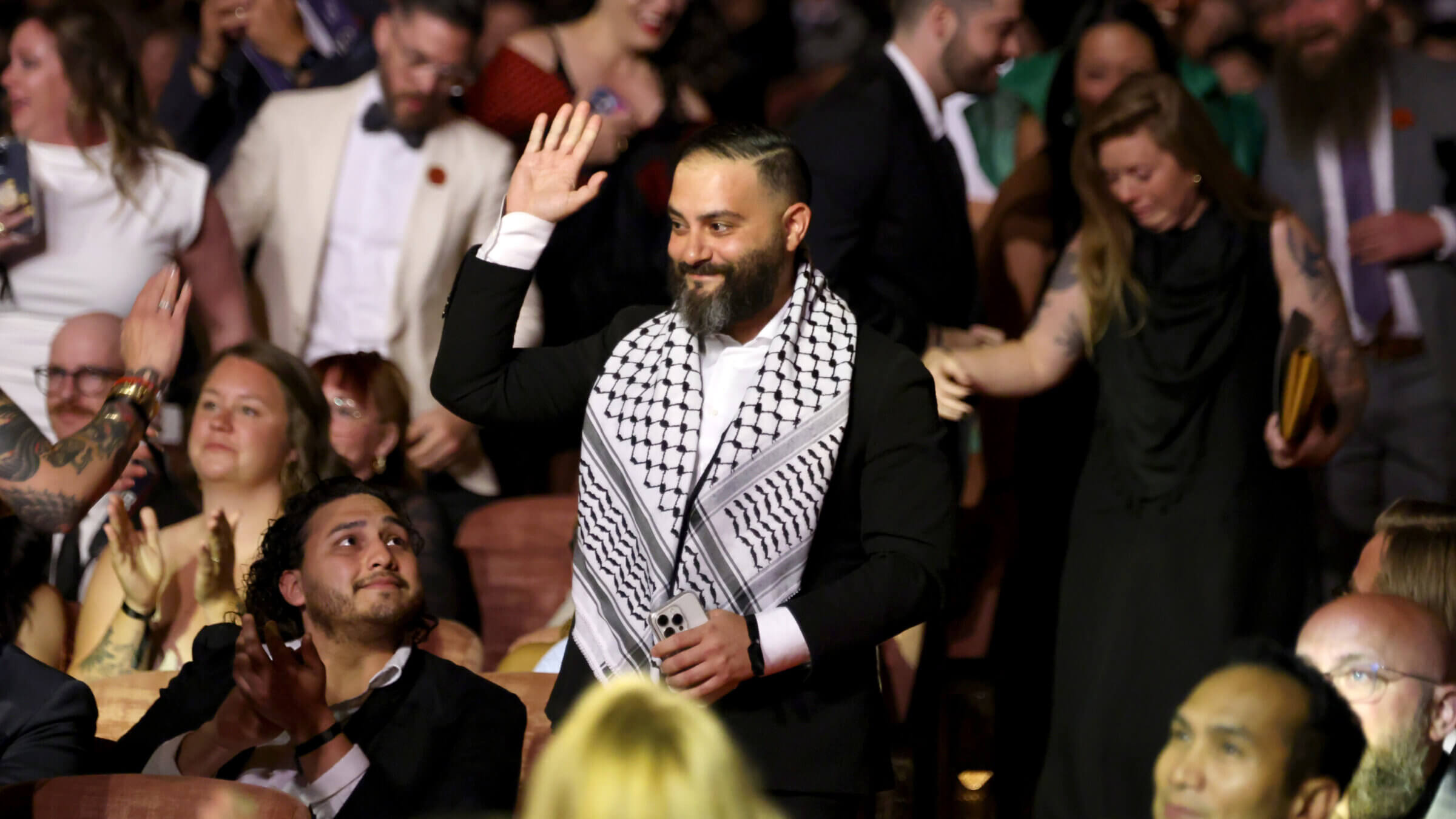A Palestinian-American chef just won a James Beard Award. Here’s what it means
Food used to bridge cultures. Now it’s politics by other means.

Michael Rafidi received Outstanding Chef at the 2024 James Beard Restaurant and Chef Awards at Lyric Opera Of Chicago on June 10, 2024. Photo by Jeff Schear/Getty Images for James Beard Foundation
It was a very Palestinian evening at the 2024 James Beard Awards.
Michael Rafidi, whose maternal grandparents immigrated to the United States from Ramallah in 1948, following Israel’s founding, accepted the award for Outstanding Chef wearing a black-and-white-checked kaffiyeh.
“This award is dedicated to Palestine,” Rafidi, founder and head chef of Albi in Washington, D.C., said in his acceptance speech at the June 10 event, “and to all the Palestinian people out there, whether it’s here or in Palestine or all over the world.”
In addition, Helen Rosner, a food writer at The New Yorker, received the Distinguished Food Writing award for three columns, with a particular focus on one, about a Palestinian restaurant, Al Basha, in Paterson, New Jersey.
“As a Jew, as a journalist, and as a person with a heart, I am appalled by attempts to justify or defend this monstrous violence,” Rosner posted to her Instagram about the Gaza War, after receiving the award.
Rafidi deserves his accolades, as does Rosner for her must-read food columns. In another year, they would have simply thanked the judges, but this year there was no question the speeches would come with a message.
The Gaza War became a culture war, and food, which had served as a rare bridge among Jews, Muslims and Arabs, has become another battlefield.
At least one Palestinian had been nominated for a Beard Award before — Reem Kassis’ cookbook, The Palestinian Table, in 2018 — but these wins, coming in the midst of a disastrous conflict, had a far greater impact.
The sad truth is that it has taken the vicious Hamas attack of Oct. 7, and the Israeli onslaught that has followed, to bring the Palestinian cause — and a new attention to Palestinian culture — to the mainstream. A poll released this week by the Palestinian Center for Policy and Survey Research found that 80% of responding Palestinians in the West Bank and Gaza believe Hamas’s attacks brought global attention to the Palestinian cause.
“Never have I witnessed the sea change in opinion and its impact on the policy debate that is now taking place,” the pollster James Zogby wrote recently about Americans’ growing embrace of the Palestinian political cause over the past eight months.
That embrace extends beyond politics to culture — as the Beard awards show.
Food is how Americans relate to different cultures, how we literally incorporate them and make them part of us. That’s what’s happening now with Palestinian food.
Before the Oct. 7 attack, many chefs, like the Maryland-born Rafidi, emphasized the cross-cultural aspect of this cuisine. The Levant, after all, was a broad region where Jews, Muslims and Christians developed, traded and ate these foods with no implied copyright.
Now, the war has pushed many such chefs to publicly embrace their Palestinian-ness — even if their dishes invoke multiple heritages. One Albi appetizer features amba, the pickled mango relish of Iraqi Jewish origin. Another dish, the rice and lentil mixture called mujadarra, is as traditional for Jews and Christians in the region as for Muslims.
Rafidi’s menu masters these various influences. Hummus is topped with coal-fired mushrooms, black garlic and egg yolk. Beets cooked in embers are paired with fermented muhamarra, a walnut and red pepper relish, and kashkaval cheese.
“It’s the food I love,” Joan Nathan, the famed Jewish cookbook author who lives in Washington, D.C., said of Albi, “and it’s so beautifully and creatively prepared.”
Palestinian food, which has been gradually gaining awareness thanks to a spate of superb Palestinian cookbooks published over the past five years and restaurants like Reem’s in San Francisco, has become a crucial messenger for the Palestinian cause, and recruited to the struggle.
Two months after the Hamas’ attack on Israel, hundreds of food and hospitality workers signed a petition, sponsored by the organization Hospitality for Humanity, calling for an immediate ceasefire, a boycott of Israeli products and cultural exchanges and an end to U.S. support for Israel.
Leading Palestinian cookbook authors and chefs, including Rafidi, signed the petition.
Cultural events like A-Sham Arab Food Festival, which brought together Arab and Jewish chefs from Israel and the occupied territories, are on ice, and longstanding relationships between Israeli and Palestinian chefs have ruptured.
In 2019, the American-Israeli chef Michael Solomonov joined with Palestinian cookbook author Reem Kassis to cook a dinner called, “Breaking Bread,” in order to raise money for Parents’ Circle, which brings together Israelis and Palestinians who have lost loved ones to war and terror. The dinner was hosted by the James Beard Foundation. Now the two aren’t talking.
“If anything,” Kassis told The New York Times last November, “my experience of late has confirmed for me that food diplomacy does not work and that you cannot solve problems like the Israeli occupation of Palestine over the proverbial plate of hummus. Anyone who claims that is deflecting from the real work that needs to be done, first of a cease-fire, but in general, freedom for and equal rights for all Palestinians.”
What that means is that Palestinians and Israelis are cooking, just no longer together—for now. Food wants to be shared, blended, transformed, across borders, time and talents.
“It’s really important to remember that in the time of peace, chefs are influenced by and learn from each other,” said Nathan. “Hopefully, one day we’ll get there again.”























